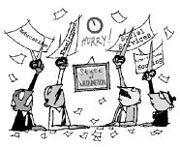LAST TUESDAY, 25,000 teachers and other educators gathered in Olympia, delivering a pointed message to Gov. Gary Locke and to our state Legislature: Find the money. Deal with Washington’s staggering $2 billion shortfall, yes, but in doing so, don’t shortchange public education. In fact, public education needs more money, not less.
Legislators hear it every day. And they’ll keep hearing it, straight through the 105-day legislative session—and the inevitable “special” sessions that will follow, because each and every year, the state Legislature cannot reach agreement on the budget in the allotted time. The final product is usually hammered out in about 72 sleepless hours in the final days of the third session and signed into law at 11:57 p.m. some bleary-eyed night.
Until then, the pilgrimage taken by the teachers will be endlessly repeated.
This week, Monday was the annual Olympia lobby day for the National Alliance for the Mentally Ill. The Welfare Rights Organizing Coalition is sponsoring a “legislative briefing,” and the Washington State Development Disabilities Council holds its annual “legislative reception.” Next week, the American Association of University Women, the League of Women Voters, and the Washington State Pharmacy Association bring their supporters to town, followed closely by the Washington Association of Housing and Services for the Aging, the Washington Low Income Housing Network, and Homeless Youth lobby day. Rather than come to Olympia—they probably couldn’t book hotel space—anti-hunger activists are hosting a “Hunger Action Call-In Day.” (Maybe they could go to Olympia and stay with the homeless youth.)
IN ANY GIVEN legislative session, our state’s 49 senators and 98 representatives and their tiny, overwhelmed staffs must consider well over 2,000 bills. The sessions run 105 days in odd-numbered, biennial budget years, 90 days in even years. Simple physics suggests legislators never even read most of those bills, let alone read them carefully, let alone refine them until they represent our best political and managerial thinking.
The workload alone demands that Washington can no longer afford to indulge in such a limited window of time each year to consider how to govern our state. When Washington entered the union in 1889, like most other states, it embraced a part-time, citizen government. The idea was good: The people representing us should live and work in our community. For three months each year, they can trundle off to Olympia, but otherwise they hold the same jobs as we, go to the same churches, listen to our concerns, and (in theory) are thus better equipped to represent us during those short legislative sessions.
Of course, in 1889, going to Olympia from, say, Spokane was a one-way trip for three months; people arrived on horses or trains, not in SUVs or commuter jets. The National Association of Medicine Show Operators probably did not have a lobby day. The 1890 census put the entire state’s population at 349,390—less than a fifth of today’s residents in King County alone. And the first budget of the state of Washington was probably less then than the current salary for a mediocre center fielder.
Running the state was, in short, a very different job. If we retained our best thinking of 1889 in how we got people to Olympia—as well as in what they do when they arrive—Interstate 5 would be several feet deep in horseshit. We no longer travel that way, and we shouldn’t govern that way, either.
WOULD longer legislative sessions and full-time legislators produce professional politicians with minimal accountability to the public? We already have them. Outside of activist groups and corporate lobbyists, few people have any idea who their state legislators even are, let alone how they vote. The money it costs to campaign, and the time it takes away from earning a separate living, ensures that only people who are independently financially secure can even consider running for office. Instead of producing office holders like us, the combination of money in politics and the huge workload that comes with a not-very-part-time job weeds out most “ordinary” citizens.
Meanwhile, the decisions of this year’s legislative session—facing the worst budgetary crisis in a generation—will affect us for years. Cutbacks in education, social services, environmental protection, law enforcement, infrastructure maintenance, and all the other branches of our immensely complex modern government must be made carefully and judiciously—not at 11:55 p.m. on the last possible day by wearily approving a final bill most legislators haven’t read, in a session so limited that most of Washington’s most urgent problems are considered either poorly or not at all.
It’s no way to run a state. Expanding the legislative session is “bigger government,” at a time when many of us don’t trust government and when the money to run it is tight. But the cost of how we currently make decisions is far greater. Making the process more sane is something we can’t afford not to do.








